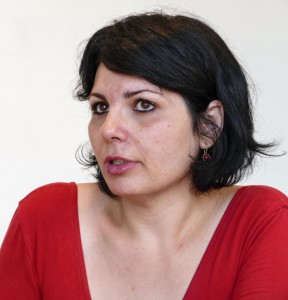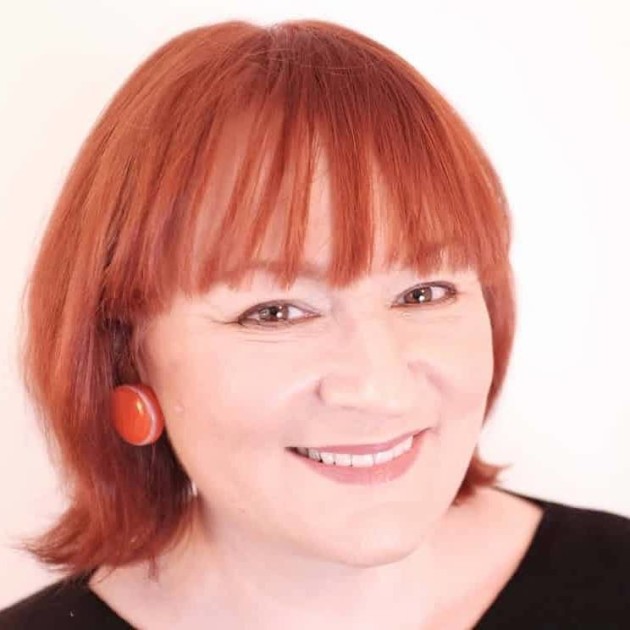The Lilith Blog
January 10, 2018 by Amy Stone
Where Are the Women Directors? Very Few at the NY Jewish Film Festival
Fresh from the #MeToo / Time’s Up show of unity at Sunday night’s Golden Globe awards, how could we not do a count of the number of women directors at this year’s New York Jewish Film Festival, opening today (January 10)? Natalie Portman’s words at the Golden Globes are still ringing in my ears. Co-presenter Ron Howard: “We are honored … to be here to present the award for the best director.” Portman: “And here are the all-male nominees.” (FYI, the only woman ever to win a Golden Globe award for Best Director was Barbra Streisand for “Yentl” in 1984.)
Certainly the NYJFF has a world of directors to choose from. A partnership of the Jewish Museum and the Film Society of Lincoln Center, the 27th annual New York Jewish Film Festival is truly an international event, bringing films and filmmakers from Israel, North America, South America, North Africa and Europe to the Walter Reade Theater and the Elinor Bunin Monroe Film Center.
- No Comments
January 10, 2018 by Emily Strauss
I Survived Domestic Violence as a Kid. It’s Why I Want To Be a Rabbi.
I would not be planning to become a rabbi if I had not experienced domestic violence as a kid. It made me determined to become a leader, so as to not allow anyone to fall through the cracks of the system and suffer behind closed doors.
It started quietly, more insidiously. It started with his putting her down, making her feel small. It began with little moments of his trying to control her. It began with the incidents my mother shrugged off, thinking that all couples argue occasionally. She put these red flags out of her mind, not even thinking of them as red flags. They’re just little blips in their marriage. She thought she could deal with them. They love each other.
Eventually, her self esteem erodes until it’s gone. The daily put-downs have eaten it away.
The moments of his trying to control her have left her living in constant fear. When the moment comes, when he physically pins her down to the floor for the first time, she flinches before his hands make contact with her body. She has been living in fear of this long before it occurred, without ever consciously knowing it.
- No Comments
January 9, 2018 by Cantor Barbara Ostfeld
When I first chanted Megilah at 19, I was harassed on the bima. I’m still not laughing, decades later.
It is almost the spring of my second year at Hebrew Union College, and I am studying cantillation.
I love it. I feel clever when I get it right and adore picking up the little nuances that only the cognoscenti appreciate.
The faculty chair asks if I will chant an excerpt from Esther on Purim during the school-wide service. I demur a bit, because I have mastered only haftarah chant so far and am just starting on Torah. Esther cantillation is part of next year’s curriculum. Still, I say yes, feeling sure that I can learn it, at least well enough to chant the assigned verses, which are Esther 7:5-10. Only a few verses, with lots of “Hamans,” so there will be lots of traditional noisemaking in the congregation to blot out his villainous name. I am excited.
- No Comments
January 8, 2018 by Rishe Groner
Why We Need to Talk About Circumstantial Infertility
It’s a cold night on the Upper West Side, and like most New Yorkers, I had a choice of events for the evening. I likely would have skipped them all; which is what happens when you’re spoiled for choice, but something drew me to this big old synagogue. The elevator in the building takes a while to arrive, so I listen to the singing coming from the main sanctuary downstairs and remark to the woman ushering people in that I might prefer to stay and listen to that.
I don’t know, I guess I just feel… well… nervous.
I was making an investment in a topic I’d sometimes thought about but mostly dismissed—pushed to the back of my mind along with retirement savings and lasik surgery. As long as I don’t think about it, don’t research it; don’t talk about, perhaps it’s not really there.
But elephants in the room have a way of growing, and when I finally arrived on the 10th floor thanks to the single ancient creaky elevator, I realized I wasn’t the only one nervously eyeing this particular elephant. Thirty women were already present—by the end of the evening probably closer to 50—and while I was relieved to see a familiar face, I wondered why I wasn’t seeing more.
The speaker took the podium and began.
“In the Orthodox Jewish community, fertility has become a hot topic as many couples marry later in life and struggle to conceive in their 40s. But tonight we are here to talk about another type of infertility—circumstantial infertility.”
- 1 Comment
January 5, 2018 by Amy Stone
Meet Maysaloun Hamoud—Fearless Female, Palestinian Filmmaker— Director of “In Between”

In Between’s director Maysaloun Hamoud. Photo credit: Joan Roth.
By Maysaloun Hamoud’s tattoos you shall know her—her film’s title on her arm in Arabic transliteration and English, “BAR BAHAR” “In Between.” Then an unexpected choice, the John Tenniel illustration of Alice in Wonderland, key in hand, pulling back the curtain to a tiny door. And at the nape of her neck, the surprise of a little head, looking just like her, peering out from the basket of a brightly striped hot air balloon.
At 36, Mayasloun Hamoud, a Palestinian Israeli filmmaker, is savoring international success with her first feature film, which she wrote and directed.
“In Between,” which opened the Other Israel Film Festival at the Manhattan JCC in November, starts a commercial run today (January 5) in New York, then January 12 in Los Angeles. The feature, in Arabic and Hebrew with English subtitles, has already garnered international film festival prizes. In Israel, its popularity soared after Hamoud was issued a fatwah for depicting young Palestinian Israelis in the Tel Aviv nightlife scene of drugs, sex and all-out partying.
- No Comments
January 4, 2018 by admin
You’ve Come a Long Way, Sister: 20 Years After Carlebach Allegations, His Daughter Hears #MeToo
On Tuesday, Lilith’s founder Susan Weidman Schneider sent out an email, subject line “and now, Neshama Carlebach weighs in.” She was writing to Managing Editor Naomi Danis and to Sarah Blustain, who reported for Lilith in 1998 about allegations of sexual harassment against famed rabbi Shlomo Carlebach, and the response from his daughter—twenty years later. “Want to respond?” Susan wrote.
The daughter’s belated response brought up a slew of memories about what it was like to report on sexual harassment before #MeToo, in a community that only now is beginning to reckon with the dark side of its spiritual leader.
- 9 Comments
January 2, 2018 by Yona Zeldis McDonough
Remembering Sue Margolis, One Author to Another

Sue Margolis
I met Sue when our mutual publisher, New American Library (NAL), gave a bunch of us with books coming out around the same time one another’s names. The goal was for us “cross promote” the novels of the other authors. Sue was the first name on my list and though she lived in London, she was often in Brooklyn to visit her married daughter. We met for the first time in a local Park Slope cafe and I liked her instantly. She was warm, funny, smart and so easy to talk to. We parsed writing, our agents, our editors, publishing in general, our kids in particular, aging parents and oh, our kids—again. By the time our lattes were history, I felt like I’d found a new friend.
Per NAL’s suggestion, Sue and I did help each other out with publicizing our respective novels. But the friendship that developed, aided by her regular visits to Brooklyn, our frequent emails, and a trip to London my husband and I made during which Sue and her husband Jonathan welcomed us so graciously, was entirely our own.
Sue had worked as a reporter for the BBC before leaving broadcasting to write her first novel. Hers was a spry, comic voice and there were half a million copies of her 14 comedic novels in print. With titles like Neurotica, Apocalypstick, and Breakfast at Stephanie’s, she was quickly branded as a lightweight, chick-lit author. But she strenuously objected to the easy categorization, and her writing was unusually sharp and precise for the genre. Her jokes and situations were often very funny, her dialogue believable, and her allusions would range freely; a Margolis novel would typically include references to leftwing politics, literature and psychotherapy. She told me that her novels did much better in the United States than in the UK; she felt that her particular brand of Jewish humor was lost on the Brits and had better reception on the other side of the Atlantic. The English, she told me, still clung to a residual anti-Semitism that was hard to shake off—or change. But after 14 novels, she was ready for a change and started work on a novel set in Berlin around and after Kristallnacht in 1938. She was excited about it. Since I, too, was working on a period novel, we talked a lot about the different demands of historical fiction.
Then one day last year, I received a group email from Jonathan. Sue, who had never been a smoker, had been diagnosed with a serious and fatal lung cancer. She began an aggressive and experimental form of treatment that kept her alive for less than a year—she died, at the age of 62, on November 1, 2017. In the email informing her friends of her death, Jonathan included some of her last writings. Reading them, I could hear her voice so clearly and although she had only been gone for a day or so, I already missed her so keenly.
1…
On Christmas Day 2016, I cook lunch for a dozen people. I spend the days before schlepping geese, spuds and bags full of seasonal goodies up two flights of stairs to our new flat – without feeling particularly breathless. I’ve had a bit of a cough since the summer, but only after meals and two GPs at the surgery where we used to live put it down to my acid reflux getting worse. I spend a few minutes after Christmas lunch hacking up phlegm in the loo. Bloody reflux.
Early in the New Year I make an appointment at our new surgery. This time, I am sent for a chest X-ray. I’m barely out of the hospital when I get a call from my GP. They’ve found something on the x-ray. It could be nasty … doctor code for cancer. My dad died of lung cancer. But he was a smoker. I’m not.
- 1 Comment
December 29, 2017 by admin
Top 10 Most Read Articles of 2017
 Curious about what 2017 articles were most read on Lilith.org? Here’s our top-ten line up! Read through them and comment with what your favorite Lilith pieces from 2017 are.
Curious about what 2017 articles were most read on Lilith.org? Here’s our top-ten line up! Read through them and comment with what your favorite Lilith pieces from 2017 are.
1. Dear Chelsea Clinton: Clara Lemlich was a Communist—and a Jew
2. The Mainstream Misogyny of the Nice Jewish Boy
3. Why Are Women Dropping Out of Synagogue Life?
4. Stop Telling Me I Can’t Sing Because It Distracts Orthodox Men
6. Stop Victim Blaming: A Response to Mayim Bialik from One Member of the Orthodox Community to Another
7. A Takedown of That Worst-Colleges-for-Jews List
8. Ivanka Shows How “Jewish Woman” Is Not the Same as “Jew”
10. Defiance
- No Comments
December 28, 2017 by Mel Weiss
How To Apply Successfully for an Internship at Lilith Magazine
Step one, and I really cannot stress this enough, is to screw up your courage, take the plunge, and hit send. Forget your fear about being exposed as a literary fraud; tell your imposter syndrome to shut up, already. (And if in thinking, Shut up, imposter syndrome, you make proper use of the apostrophizing comma, soothe yourself with the idea that you could soon be in really solid company.)
Coax up in yourself the kind of patience that is also a kind of impatience. You want to change the world, but through print and pixels, so this should come fairly naturally to you. Write your first email with pizzazz, with passion, with professionalism. Have a dynamic introduction, explain your immense qualifications, but with a little self-deprecating humor—we’re feminists, after all.
- No Comments
December 27, 2017 by Deborah Krieger
Loved the New Star Wars? Here’s a Jewish, Feminist Angle to Consider
 Note: This essay contains spoilers.
Note: This essay contains spoilers.
While Hanukkah has just wound down, there’s plenty of Maccabee spirit still floating around from a long time ago, in a galaxy far, far away. After all, as we’re told many, many times over the course of Star Wars: The Last Jedi, the Resistance’s ship—now its sole bulwark against the fascistic First Order—only has several hours worth of fuel left. Defeat seems inevitable, and yet, of course, the Resistance manages to scrape together a victory, living to organize and fight another day.
For those of us in the audience who learned about the little jar of oil that provided enough light for eight nights, the Resistance’s fuel struggles certainly lent the usual underdog-versus-imperial forces a very Jewish flair. Poe Dameron (Oscar Isaac) even works as a would-be Judah Maccabee—at least, he sees himself as the kind of loose-cannon leader the Resistance needs in the face of what he perceives to be the passivity of Vice-Admiral Holdo (Laura Dern). Of course, it is Holdo whose careful strategizing and personal sacrifice (as well as judicious use of fuel) keep the Resistance from being completely destroyed by the sheer might and firepower of the First Order.
Women saving the day is a general theme in this film. In fact, The Last Jedi commendably has more women in central roles than any previous Star Wars movie. Apparently Leia was the only woman in all of the galaxy when she, Luke and Han were young and scrappy, fighting Darth Vader and hanging out with Ewoks. Having a whopping four women with major roles is a huge step forward. Even progressive Star Trek (both the original series and its big-screen reboot) only had one woman in the main Enterprise crew.
That said, it remains in question how effective, well-written, and engaging these female characters actually are, and the results do vary.
- No Comments
 Please wait...
Please wait...